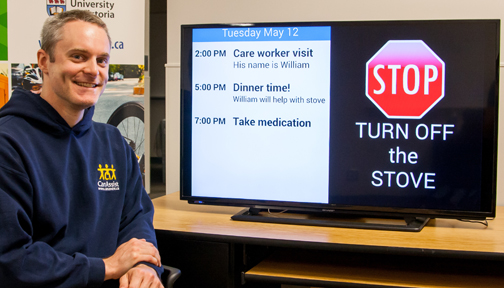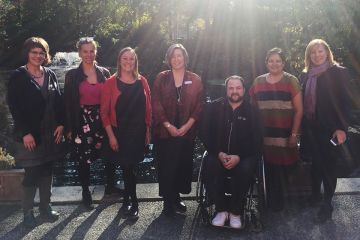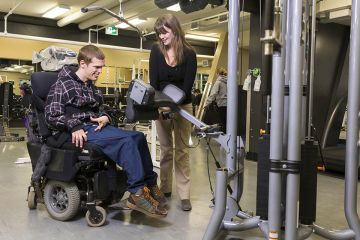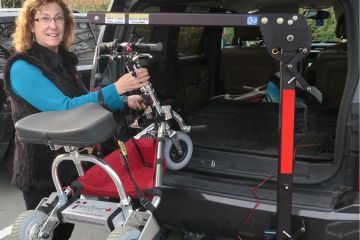CanAssist technologies help people remain independent longer
- Anne Tolson

Thousands of British Columbians living with dementia and other challenging conditions will benefit from innovative new technologies being developed by CanAssist at the University of Victoria.
Prototypes of several technologies aimed at helping people stay in their homes for as long as safely possible were demonstrated May 11 during a funding announcement by BC Minister of Health Terry Lake.
One technology, the “wandering deterrent system,” uses computer screens that flash personalized video messages to discourage a person from leaving the house late at night—a fairly common occurrence among those with dementia.
“This system would allow me to stay in my home longer and give me quality of life and independence,” said Jim Mann, who lives with Alzheimer’s disease and was on hand at the announcement to help demonstrate the system.
“I’m a huge fan of this system because it is personal—with the caregiver visually suggesting the action to take—and it’s non-intrusive,” he adds.
During the event, the minister announced $3 million in new funding, which will enable CanAssist to develop an innovative technology that will benefit thousands of people across the province starting in 2016. CanAssist is working with ministry staff to determine the theme or focus for this most recent investment in the development of new and innovative technologies.
The funding will also be used to launch a new online service for individuals and organizations looking for information about existing and emerging technologies that can help people with a range of disabilities.
In March 2014, CanAssist received $2 million from the Health Ministry for the CanStayHome program, which will result in a suite of innovative technologies that support vulnerable BC seniors and others to stay in their homes longer—enhancing their well-being and quality of life, while at the same time reducing pressure on the province’s health system.
The “wandering deterrent system” is one of the technologies being developed and tested as part of CanStayHome. Another is the “phone-in monitoring system,” which allows family members and other caregivers to check in on someone with dementia remotely, without invasive monitoring equipment and costly subscriptions.
The system uses basic landline phone connectivity already in the home, along with a small number of sensors. These sensors monitor the individual’s presence in various rooms and also indicate if the door leading to outside opens.
Simply by calling the home phone and entering a code, the caregiver of a person with dementia gets a summary of activity, such as: “Mom is in bed and has been there for 30 minutes” or “Mom is in the bathroom; her last activity was detected five minutes ago” or “There has been no activity for four hours,” and so on.
“We can all relate to the importance of personal independence, which is why government is committed to ensuring supports for people with disabilities and seniors,” said Lake. “Funding the development of technology to support independence so people can stay safely and comfortably at home puts patients’ needs first and contributes to a better quality of life.”
Robin Syme, executive director of CanAssist, says this new funding will help her team extend the benefits of innovative technologies for people with disabilities across the province.
“We’re very excited to work with ministry staff, as well as the five regional health authorities, to begin researching and developing innovative yet highly practical technologies that will benefit many British Columbians and their families for years to come,” she says.
Photos
In this story
Keywords: CanAssist, technology, adaptive technology, funding
People: Robin Syme, Terry Lake





